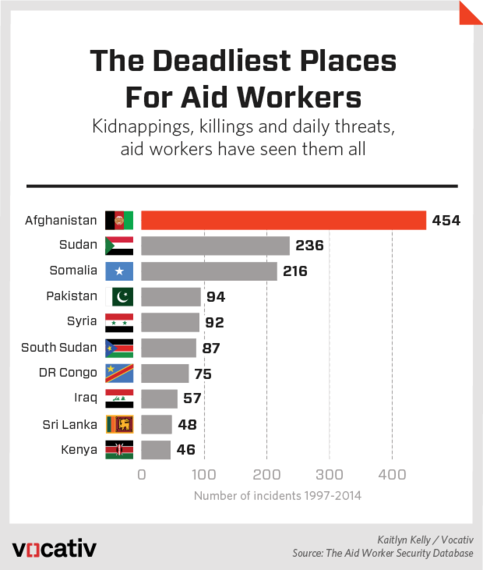
By John Knefel
A recent deadly U.S. airstrike against a hospital in northern Afghanistan was only the latest attack amid the myriad dangers humanitarian workers face in the war-riven country. From 1997 to the end of 2014, more than 450 aid workers were killed, assaulted, or kidnapped in Afghanistan, making it the most dangerous country in the world for doctors, relief workers, and other humanitarians, according to data from the Aid Worker Security Database.
The U.S. strike on Saturday destroyed a hospital in Kunduz and killed 22 people, including 12 from Medecins Sans Frontieres, the non-governmental organization that ran the clinic. MSF officials have demanded an independent investigation into what they've described as a war crime. According to the Aid Worker Security Database, which receives partial funding from U.S. Agency for International Development (USAID), the airstrike was the single deadliest incident for aid workers in Afghanistan since 2001. President Obama apologized for the strike in a phone call with the president of MSF International on Wednesday.
Medical facilities run by NGOs, the U.N., Red Cross, or other groups considered to be aid agencies, have come under fire before in Afghanistan. An MSF maternity ward in Khost, eastern Afghanistan, was bombed six weeks after it opened in 2012. After being temporarily closed after the attack it eventually reopened, assisting in over 1,000 births a month by the following year. In 2004, MSF left Afghanistan entirely when three of its staffers were killed by Afghan military commanders. The group did not return for five years. It has now abandoned Kunduz because of the U.S. airstrike.
Aid workers face a range of other threats in the country, including from the Taliban and Afghan national security forces. Roadside ambushes are the most common form of attack, often because aid workers are caught in crossfire between pro-government and Taliban forces.
Kidnapping is another constant danger in Afghanistan. There have been at least 370 abductions of aid workers since 2001. In some cases, the length of confinement was short, and tribal elders negotiated with Taliban militants for a quick release. Other times, the kidnapping of Westerners was drawn-out, leading to either payment of a large ransom, or death of the hostage.
President Obama has pledged that all U.S. troops will withdraw from Afghanistan by the end of 2016, but Gen. John Campbell, the top U.S. commander in Afghanistan, said this week that U.S. troops may need to stay beyond that timeframe. "Based on conditions on the ground, I do believe we have to provide our senior leadership [with] options different than the current plan we are going with," Campbell told a Senate hearing on Tuesday.
More stories from Vocativ:
